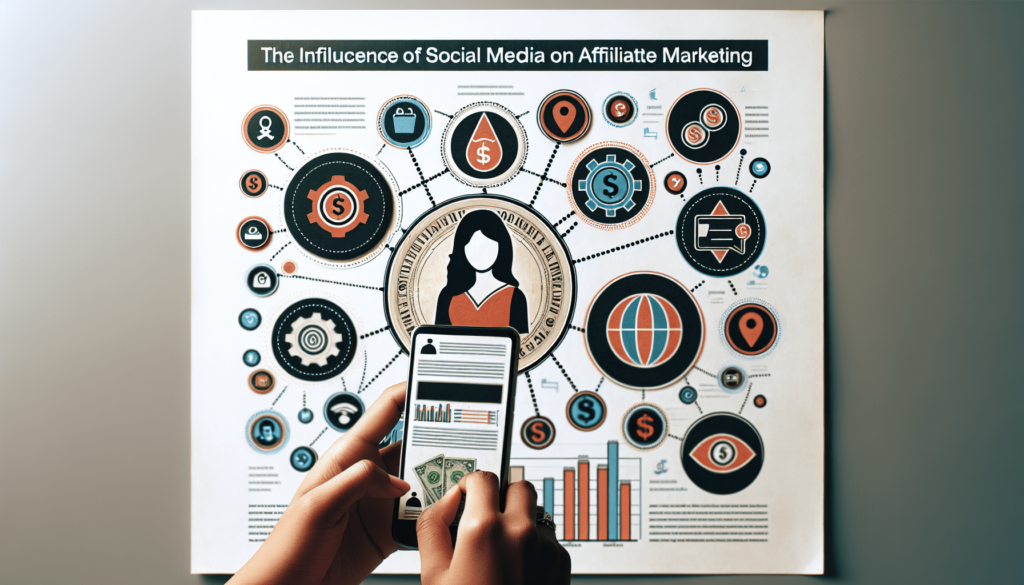In today’s digital age, social media has undoubtedly become an integral part of our lives. But did you know that it can also be a powerful tool for affiliate marketing? By leveraging the reach and influence of various social media platforms, businesses can tap into a vast pool of potential customers and boost their revenue streams. In this article, we will explore the transformative power of social media in affiliate marketing and how it can help businesses thrive in the competitive online landscape. So, grab your phone, sit back, and get ready to discover the untapped potential of social media in driving affiliate marketing success.
Increased Reach and Visibility
In today’s digital age, social media platforms have become powerful tools for expanding your audience and increasing brand visibility. With billions of active users across various platforms like Facebook, Instagram, Twitter, and LinkedIn, the potential reach is immense. By establishing a strong presence on social media, you can tap into a vast pool of potential customers who might be interested in your products or services.
One effective strategy for expanding your reach through social media is to leverage social media ads. This allows you to specifically target and reach your desired audience based on criteria such as demographics, interests, and behavior. With the help of advanced targeting options provided by social media platforms, you can ensure that your advertisements are seen by the right people at the right time. This not only increases your brand awareness but also enhances the chances of reaching potential customers who are more likely to engage with your content or make a purchase.
Another way to increase your reach and visibility on social media is by collaborating with influencers. Influencers have a large following on social media platforms and can greatly impact consumer behavior. By partnering with influencers in your niche, you can tap into their loyal fan base and gain exposure to a broader audience. This form of promotion can be highly effective as it comes from a trusted source, making it more likely for their followers to engage with your brand and make a purchase.
Easy Tracking and Analytics
Utilizing social media analytics tools can provide valuable insights into your marketing performance. These tools help you measure important metrics such as engagement rate, reach, follower growth, and click-through rates. By analyzing this data, you can determine the effectiveness of your social media campaigns and make informed decisions to optimize your strategies.
Tracking affiliate links and conversions is another aspect of social media marketing that can be easily achieved. Most affiliate marketing programs provide unique tracking links for their affiliates. By embedding these links in your social media posts or ads, you can track the number of clicks, conversions, and ultimately, the revenue generated through your social media efforts. This data can be invaluable in measuring the success of your affiliate marketing campaigns and identifying areas for improvement.
Identifying trends and optimizing your marketing strategies is essential for staying ahead in the ever-evolving digital landscape. Social media platforms offer ample opportunities for market research and trend analysis. By keeping a close eye on consumer behavior, popular hashtags, and industry trends, you can tailor your content and marketing campaigns to better resonate with your target audience. This constant optimization can lead to increased engagement, higher conversion rates, and better overall performance.

Targeted Advertising
One of the biggest advantages of social media marketing is the ability to leverage the algorithms of these platforms to target specific audiences. Social media platforms collect a vast amount of user data, including demographics, interests, and online behavior. This data allows you to create highly targeted advertisements that are displayed to users who are most likely to be interested in your products or services.
Customizing your ads based on user demographics and interests further enhances the effectiveness of your marketing efforts. By tailoring your content to match the preferences of your target audience, you increase the chances of capturing their attention and driving them to take the desired action. This personalized approach not only improves your conversion rates but also helps build a stronger brand-customer relationship.
In addition to demographics and interests, you can also target potential customers based on their social media behavior. For example, you can create ads that specifically target users who have previously engaged with your posts, visited your website, or added items to their cart but did not make a purchase. This kind of retargeting allows you to remind potential customers about your brand and encourage them to complete the purchase they may have abandoned.
Engagement and Interaction
Creating engaging content is key to capturing and retaining the attention of your social media followers. By providing valuable and entertaining content, you can establish yourself as an authority in your industry and build a loyal following. Social media platforms offer a variety of content formats such as images, videos, stories, and live streams, enabling you to showcase your brand in creative and engaging ways.
Encouraging discussions and user-generated content is another powerful way to boost engagement on social media. By asking questions, running polls, or hosting contests, you can encourage your followers to actively participate and share their opinions. User-generated content, such as customer reviews, testimonials, and photos, can also help build trust and credibility around your brand. This kind of organic engagement not only increases brand visibility but also fosters a sense of community among your followers.
Building a community around your brand on social media is a valuable long-term strategy. By nurturing relationships with your audience, you create a space where customers can connect with each other and with your brand. Encourage your followers to share their experiences, ask questions, and provide feedback. The sense of belonging and community associated with your brand can lead to increased brand loyalty and advocacy.

Building Trust and Credibility
Building trust and credibility is essential for the success of any business, and social media platforms play a crucial role in this aspect of marketing. Social proof, such as user reviews and testimonials, can significantly influence consumer behavior. By encouraging your satisfied customers to leave reviews or share their positive experiences on social media, you can leverage this social proof to attract new customers.
Utilizing influencers to endorse and recommend your products or services can also help build trust and credibility. Influencers have established themselves as trusted voices in their respective niches, and their followers often value their opinions and recommendations. Partnering with influencers who align with your brand values and target audience can help you reach a wider audience and gain credibility through association.
Sharing authentic and transparent content on social media is another effective way to gain trust. People appreciate honesty and transparency, and showcasing the human side of your brand can help establish a deeper connection with your audience. Whether it’s behind-the-scenes glimpses of your business, stories of customer success, or sharing your brand’s values and mission, authenticity can go a long way in building trust on social media.
Cost-Effective Marketing
One of the biggest advantages of social media marketing is its cost-effectiveness compared to traditional marketing channels. Social media platforms offer a wide range of advertising options, including sponsored posts, display ads, and video ads, at various price points. This allows businesses of all sizes to allocate budgets that suit their needs and reach their target audience without breaking the bank.
Maximizing return on investment (ROI) is an important aspect of any marketing strategy, and social media marketing provides ample opportunities for this. By targeting specific audiences, tracking conversions, and analyzing the performance of your campaigns, you can fine-tune your strategies to maximize the impact of your marketing budget. Additionally, the organic reach and word-of-mouth marketing potential of social media can further enhance the cost-effectiveness of your marketing efforts.
Real-Time Feedback and Market Research
Social media platforms provide a direct line of communication with your customers, allowing you to obtain instant feedback and insights. Customers can leave comments, send messages, or even tag your brand in their posts, providing valuable feedback on their experiences with your products or services. By actively engaging with your customers and responding to their feedback in real-time, you demonstrate a commitment to customer satisfaction and build a positive brand reputation.
Conducting surveys and polls on social media can also help gather insights about your target audience. You can use these tools to learn more about their preferences, needs, and pain points, allowing you to tailor your marketing strategies accordingly. Additionally, monitoring competitor activity and staying informed about industry trends through social media can help you stay ahead of the curve and make informed business decisions.
Enhanced SEO and Website Traffic
Social media can play a significant role in enhancing your website’s search engine optimization (SEO) efforts. By generating backlinks through social media shares and mentions, you can increase your website’s authority and improve its search engine rankings. When influential social media users or publications share your content, it signals to search engines that your website is valuable and relevant, leading to increased organic traffic.
Social media platforms also drive direct traffic to your website through referrals. By sharing links to your website in your social media posts and bio, you can entice users to click and visit your website. The more engaging and enticing your social media content is, the higher the chances of attracting users to explore your website further. This increased website traffic can lead to higher conversion rates and more sales.
Additionally, social signals, such as likes, shares, and comments on your social media posts, can also impact your search engine rankings. Search engines take into account the popularity and engagement of your social media content when determining the relevance and authority of your website. By creating engaging and shareable content on social media, you can indirectly boost your website’s SEO efforts.
Personalization and Customization
Social media platforms provide valuable data about their users, allowing you to personalize and customize your marketing efforts. By tailoring your content and promotions to individual customers, you can create a more personalized and enjoyable experience. This personalization helps build a stronger connection with your audience and increases the likelihood of them engaging with your brand.
Retargeting techniques enable you to reach interested prospects who have previously interacted with your brand on social media. For example, you can create ads specifically targeted at users who have visited your website but didn’t make a purchase. By reminding them of their previous engagement with your brand, you can increase the chances of them returning and completing the desired action.
You can also provide personalized recommendations based on social media data. By analyzing the interests, preferences, and behaviors of your social media followers, you can suggest products or services that align with their specific needs. This customization creates a tailored experience for your customers and enhances their overall satisfaction with your brand.
Instant Communication and Customer Support
One of the distinctive features of social media is its ability to facilitate instant communication and customer support. Customers can reach out to your brand through comments, direct messages, or even live chat features on social media platforms. By responding to customer inquiries and resolving issues in real-time, you demonstrate your commitment to customer satisfaction and build a positive brand image.
Providing personalized support through social media channels allows you to address customer concerns in a timely and convenient manner. Instead of waiting on hold or sending emails, customers can reach out to your brand through their preferred social media platform and receive immediate assistance. This quick and efficient communication can lead to higher customer satisfaction and loyalty.
Utilizing chatbots and artificial intelligence (AI) can further enhance your customer support on social media. Chatbots can handle basic customer queries, provide instant responses, and even guide customers through the purchasing process. By automating certain aspects of customer support, you can provide round-the-clock assistance and free up resources to focus on more complex customer issues.
In conclusion, social media has immense power in affiliate marketing. By leveraging social media platforms, you can expand your reach, increase brand visibility, and tap into targeted audiences. The easy tracking and analytics tools available enable you to measure performance, identify trends, and optimize your marketing strategies. Through targeted advertising, engagement and interaction, building trust and credibility, and cost-effective marketing, social media offers a wide range of benefits for affiliate marketers. Real-time feedback, enhanced SEO, personalization, and instant communication further contribute to the effectiveness of social media in affiliate marketing. Embracing the power of social media can help you elevate your affiliate marketing efforts and achieve meaningful results.

